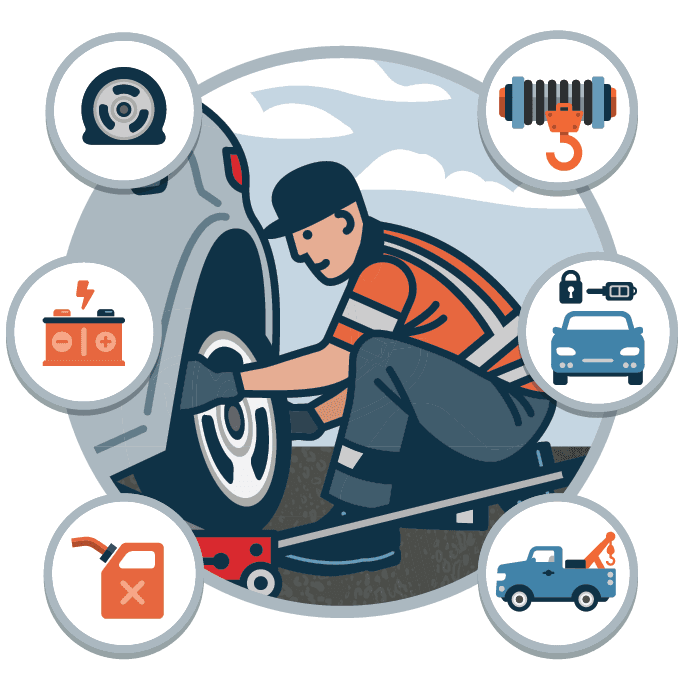A Guide to Safety for Stranded Motorists
It's a scenario nobody ever hopes to be in: You're stranded on the road, unable to drive your vehicle — whether because of mechanical failure, dangerous weather conditions, or an accident. You can't predict when or if it might happen to you, but you can arm yourself with the knowledge of how to stay safe and get help if it does happen.
Curbside SOS is there for stranded motorists, instantly connecting you to a nationwide network of over 4000 independent roadside assistance providers, so you can get local help, fast. They are there whenever you need them — but in the meantime, get familiar with these safety tips and expert advice so you know what to do if you find yourself stranded.
In this article:
- Calmly Assess Your Situation
- Move to a Safe Location
- Alert Other Drivers
- Reach Out for Help
- Stay Prepared with an Emergency Kit
- Stay Safe When Accepting Help
Calmly Assess Your Situation
When you find yourself stranded, the first step is to calmly assess what's wrong. Is it something like a flat tire or more serious like an engine failure? Figuring out the nature of the problem is key to deciding your next move, whether that's fixing it yourself or needing professional assistance.
If you're in a situation where you feel unsafe, or if there's immediate danger to you or anyone with you, don't hesitate — call 911 right away. They can get you the right help and guide you on how to stay safe while you wait. Remember, in emergencies, your safety is the top priority.
Move to a Safe Location
If you find yourself in a situation where your vehicle needs to stop, try to pull off the road and onto the shoulder. This reduces the risk of accidents and makes it easier for help to reach you. In cases where your vehicle is in a dangerous position, like in the middle of the road after an accident, and you can't move it, your first instinct might be to get out and find a safer spot. However, before you exit, carefully check the traffic and your surroundings. On busy highways, it's often safer to remain in your car with your seatbelt fastened, waiting for help to arrive. Getting out in heavy traffic increases the risk of injury.
Should you decide it's safe to leave your vehicle, especially if you're on the side of the road, make sure to move to a location well away from the flow of traffic. Ensure you and any passengers are visible to other drivers. In low-light conditions, use a flashlight — either from your phone or your emergency kit — to improve your visibility to others.
Alert Other Drivers
As soon as you find yourself stranded, switch on your hazard lights. This is a universal signal that tells other drivers you're in trouble. If you have reflective triangles or flares, and it's safe to step out, place them around your vehicle. Position one close to your car and the others further back. This setup is especially crucial at night or in poor visibility, as it alerts oncoming traffic to slow down and carefully pass your vehicle.
But these visibility aids do more than help avoid accidents. They also make it easier for roadside assistance and emergency services to spot you. Even in daylight or when visibility is good, it's wise to signal for help. You can do this by opening your car's hood or tying a brightly colored cloth to the door handle. These are clear signs to anyone passing that you need assistance.
Reach Out for Help
When you're in a safe spot and have made your vehicle noticeable, it's time to call for help. If you're part of a roadside assistance program, keep your membership information close by. For those without a membership, Curbside SOS offers a quick solution. They can easily connect you with local roadside assistance using just a few details. When you reach out, be as specific as you can about your location and the issue you're facing. This helps ensure that help arrives swiftly with the right equipment.
It's also smart to let family or friends know about your situation. Tell them where you are and that you've sought assistance. Keeping someone informed about your whereabouts adds an extra layer of security, particularly if help takes longer to arrive than expected.
Stay Prepared with an Emergency Kit
An emergency kit can be a lifesaver when stranded — which is why it's so important to put one in your vehicle now, before you become stranded or your car breaks down. A well-stocked kit should include:
Water.
Non-perishable snacks.
First-aid kit.
Blankets.
Flashlight with extra batteries.
Multi-tool.
Portable cell phone charger.
Seasonal items like an ice scraper, a sunshade, and additional coolant and windshield wiper fluid can also be invaluable, depending on the time of year.
Periodically check your emergency kit to ensure all items are in working order and replace anything that's used or expired. Being prepared with the right tools and supplies can make waiting for assistance safer and more comfortable.
Stay Safe When Accepting Help
When you're stranded and waiting for professional help, it's not uncommon for other motorists to stop and offer assistance. While most of these good Samaritans have the best intentions, it's important to stay cautious. It's perfectly fine to talk to them through a window that's only partially opened, rather than opening your door fully. Always trust your instincts; if something feels off, it's okay to politely decline their help and wait for the professionals.
If you do decide to accept help from someone, like their offer to stay with you until help arrives, ensure you remain in a place where you feel secure. This could mean staying inside your locked vehicle. Remember, when roadside assistance gets there, they'll have the expertise and tools needed to assist you effectively.
